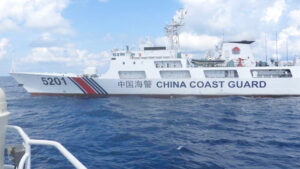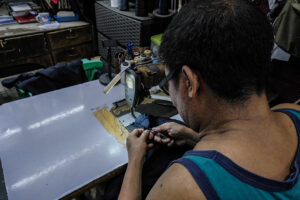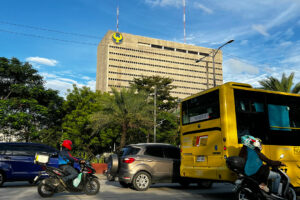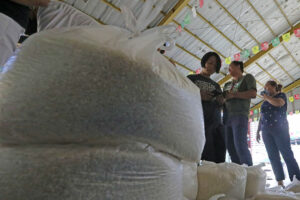ByKyle Aristophere T. Atienza and John Victor D. Ordoñez, Reporters
THE GOVERNMENT of President Ferdinand R. Marcos Jr. should temper its expectations for the Association of Southeast Asian Nations (ASEAN) under the leadership of Malaysia to support its case in its sea dispute with China, political analysts said.
Philippine officials who push security measures focused on ASEAN’s ways should consider the bloc’s “long track record of failing to respond to maritime security issues,” said Raymond M. Powell, a fellow at the Gordian Knot Center for National Security Innovation at Stanford University.
“The Philippines should temper its expectations of what support it can expect from ASEAN,” he said in an X message. “China has exploited ASEAN’s divisions to drag out the Code of Conduct negotiations for over two decades while consolidating its effective control over the South China Sea.”
“There is no downside to reminding ASEAN about China’s maritime aggression, as several of its other member states face the same adversary, if not as acutely,” Mr. Powell said. “However, the Philippines has years of painful experience that ASEAN is not an effective collective security organization.”
He added that ASEAN’s ineffectiveness as a forum against China’s incursions in the South China Sea is why the Marcos administration is seeking global partners.
“It is unlikely that Malaysia’s chairmanship will result in any groundbreaking or radical changes in steering ASEAN towards overtly stating the acute challenges the Philippines faces from China in the maritime domain,” Don Mclain Gill, who teaches international relations at De La Salle University in Manila, said in a Facebook Messenger chat.
“From Manila’s point of view, a prudent and practical expectation towards ASEAN’s position on the South China Sea should be expected,” he added.
The 10-member bloc will be headed by Malaysia, which is known for its strong trade ties with China, next year.
Malaysian Prime Minister Anwar Ibrahim said on the sidelines of the Shangri-la dialogue in Singapore last month that external parties should not be involved in the South China Sea dispute.
Tensions between the Philippines and China have worsened in the past year as Beijing continues to block resupply missions to Second Thomas Shoal, where Manila grounded a World War II-era ship in 1999 to assert its sovereignty.
There have been renewed calls for Manila to seek the help of ASEAN especially after President Ferdinand R. Marcos told the Singapore security forum his country is still banking on the bloc’s “centrality.”
Mr. Marcos has pursued closer ties with the US and other Indo-Pacific powers such as Japan and Australia amid growing tensions with China.
The Philippines has gained strong international support after it launched a transparency campaign last year that seeks to expose Chinese aggression within the Philippines’ exclusive economic zone such as the use of water cannons and dangerous maneuvers.
In mid-May, the Chinese Coast Guard seized food and supplies meant for Filipino troops stationed at BRP Sierra Madre.
‘CHINA’S TRAP’Second Thomas Shoal, which is just about 100 nautical miles west of the Philippine province of Palawan, is among the features within the Philippines’ EEZ that are being frequented by Chinese coast guard and militia — and in some cases Navy — ships.
On Sunday, the Stanford-based Project Myoushu reported that China’s maritime militia swarm at Iroquois Reef, located at the southern end of the gas- and oil-rich Reed Bank, has risen to at least 26 ships as of June 2.
Philip Arnold P. Tuaño, dean of the Ateneo de Manila University School of Government, said any plans that limit the scope of Manila’s security plans does not bode well for some of its economic issues, including energy insecurity.
“The Philippines can navigate this complex landscape by fostering bilateral and multilateral partnerships including increasing unofficial links with Taiwan and enhancing cooperation with Japan and South Korea,” he said in an e-mail.
Manila should also strengthen its defense capabilities and leverage international fora such as the United Nations and International Maritime Organization, he added.
“By actively engaging both partners with ASEAN and with external allies and making use of international fora, the county can better safeguard its strategic interests while contributing to regional stability.”
More than $3 trillion worth of trade passes yearly through the sea, which China claims almost in its entirety. A United Nations-backed tribunal in 2016 voided its claim for being illegal.
“Raising this issue with and discussing it in ASEAN is a course of action that should be taken by the Philippine government, but not to the exclusion of other actions that could or are already being taken by the Philippines,” Herman Joseph S. Kraft, former chairman of the University of the Philippines Political Science Department, said in a Viber message. “But will having these dialogues make China less provocative in its actions?”
The Philippines should be careful not to fall into China’s trap of referring its legitimate security concerns solely to bilateral talks on one hand or to ASEAN’s code of conduct negotiations on the other, Mr. Powell said.
He said China shows no interest in completing an enforceable code of conduct for the South China Sea.
ASEAN and China have been in talks as far back as 2002 to craft the code, with both sides seeking to fast-track the measure.
In November, Mr. Marcos said he had approached Malaysia and Vietnam to discuss crafting a code of conduct, citing limited progress in striking a broader regional pact with Beijing.
The Chinese Foreign Ministry has said it is willing to work with ASEAN members including the Philippines to manage differences at sea and deepen sea-related cooperation.
“The question, however, is what is the intended outcome of any of these actions including having dialogues with ASEAN?” Mr. Kraft asked.
“Will resupply missions to Ayungin (Second Thomas Shoal) be allowed to proceed without any preconditions tantamount to accepting China’s interpretation of the status quo in the West Philippine Sea?”





